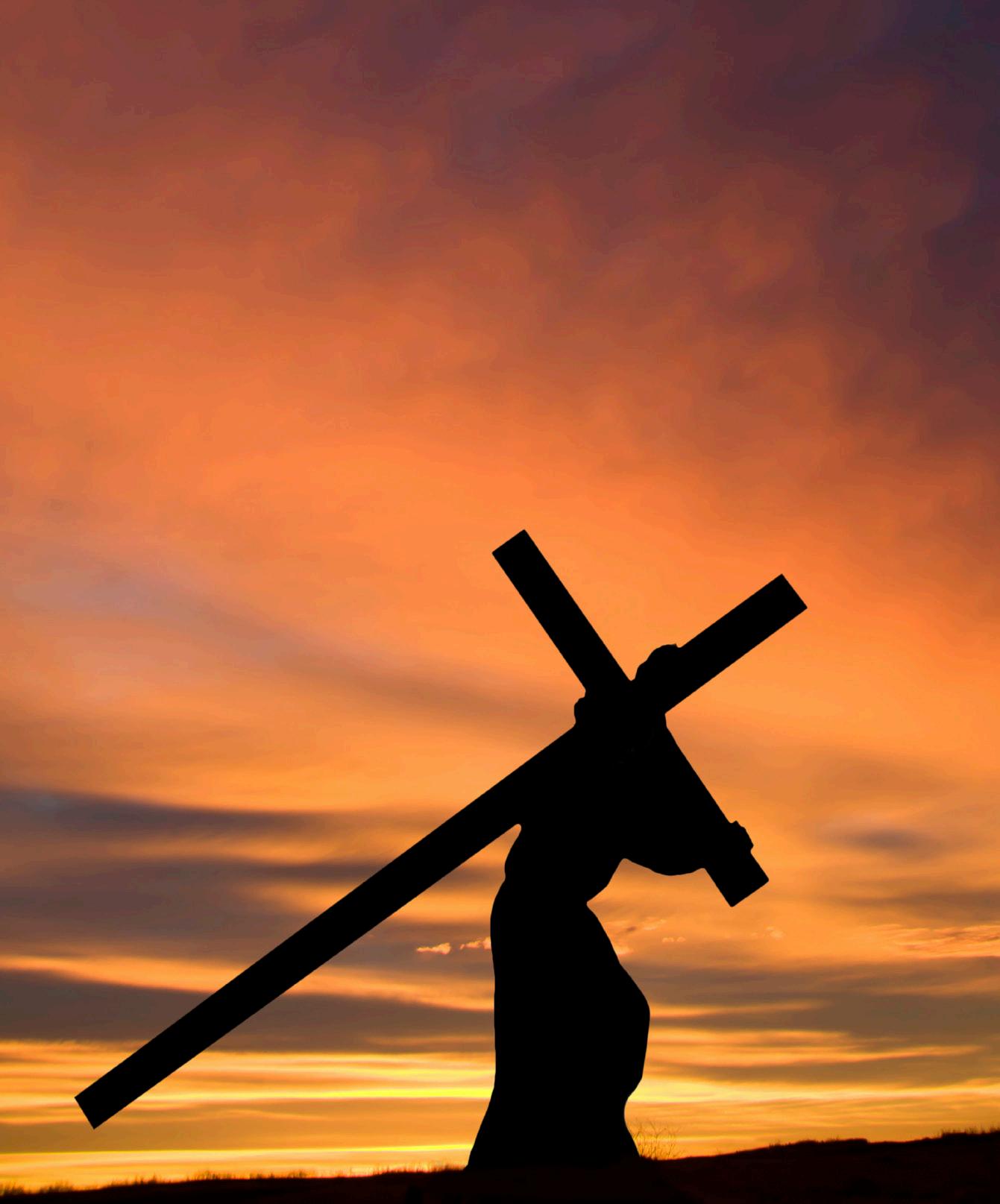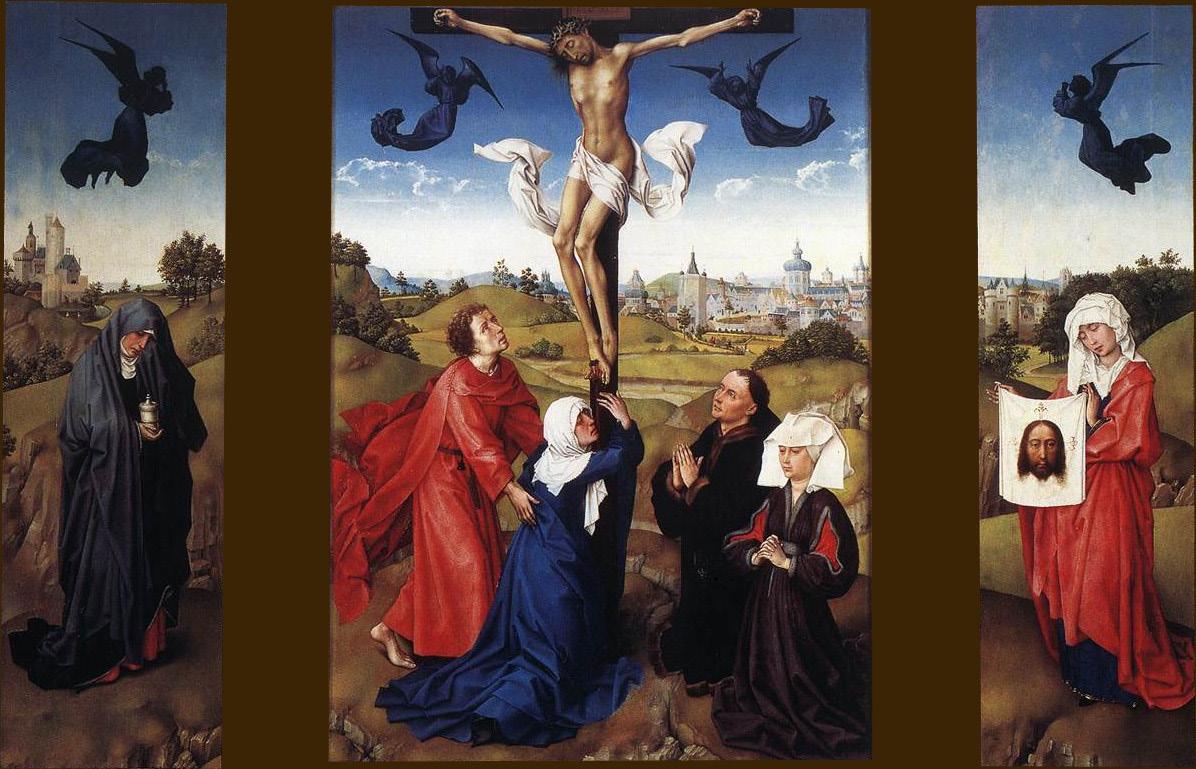
5 minute read
Christ the seven last words of
Resurrection is integral to our Christian faith. But you cannot have resurrection without death. There’s something quite powerful, though, about the fact that we spend a whole season of the church year (Lent) reflecting on Christ’s life and death, even while we know the Good News of Resurrection awaits us on Easter morning.

During Holy Week, we slow down even more. We leave Palm Sunday ushered into the Passion of Jesus as we take the journey, again and anew, to the cross. Our stories – yours, mine, each of ours – are entwined in that journey of Christ as Christ journeys with us today.
The seven last words (or phrases) of Christ have been used as a tool for meditation by Christians since around the 17th century. These phrases are drawn from the gospels and capture much of who Jesus was and is. Christians have used these phrases as a way to pray for others, to reflect on their own lives, and, ultimately, to approach the cross of Christ and the empty tomb in a new way. This year we invited our four Pinnacle pastors along with three pastors who worship with Pinnacle who are engaged in ministries of hospice and hospital chaplaincy and spiritual direction to share written meditations on the seven last words.
continued on page 6
Rev. Erik Khoobyarian
For they know not what they do. What a strange wonder it is that Jesus offers forgiveness from the cross. Not anger. Not even sorrow at this point. He offers forgiveness. It should come as no wonder, of course, as we look at the life that Jesus lived, but it still shakes me.
Even in the final days of his life, Jesus lived out the commitment to love that went beyond the failures of those around him. Even Judas shared the cup at the Last Supper. Even Judas had his feet washed. Jesus knew that he would be betrayed by Judas, he knew that he would be denied by Peter, he knew that those with power would kill him. They didn’t know what was happening and what would happen, but Jesus did know. And in his knowledge – knowing all that he knew about them and about what was happening and would happen, Jesus forgave.
I struggle with forgiveness. I struggle with receiving forgiveness and with forgiving others or even myself. When I turn and face the cross, though, I am challenged by Christ’s forgiveness of those who know not what they do. Those, like me, who know not how what we do impacts the body of Christ and how our thoughts, actions, failures to act, and even our thoughts seem to distance us from Jesus. Father, forgive them, Jesus prays.

The forgiveness we experience in Jesus is a forgiveness that goes beyond a list of our actions, though. The forgiveness of God is a radical reconciliation of humanity to the one who created us in the divine image. Even when we do not realize how we try to distance ourselves from Jesus, or even deny, betray, or crucify Jesus, Jesus still loves, cares for, and forgives us.
Imagine today that Jesus is praying these words for you. Father, forgive them. Allow yourself to experience the forgiving love of Jesus and consider how you might live your life in a way that is transformed by God’s reconciling, radical, act of love.
Ben McConaughy
John teaches that “whoever believes in [Jesus] shall not perish but have eternal life.” John 3:16-17. While Jesus does not condemn the world, the condemnation of the world is vividly on display in Calvary. Jesus, condemned for claiming to be the Messiah; the two criminals, condemned for their crimes. The condemnation continues even after they are nailed up when the first criminal mocks Jesus, asking why he does not “Save yourself and us.”
The second criminal changes the focus from condemnation to salvation. “Stop,” he tells his partner in crime. We are getting what we deserve, but Jesus is innocent. He boldly requests that Jesus:
“remember me when you come into your kingdom.” Jesus responds, “Truly I say to you, today you will be with me in paradise.”
The first criminal’s suggestion that Jesus cannot save them is ironic. For that is exactly what Jesus is doing. In His sacrificial death, we are saved from sin. No matter where we are or what we have done, we are saved from the sting of death and granted eternal life.
Jesus’ words to the second criminal in the last moments of his life, seem to be about being with Jesus in Heaven. But what do these words mean to us? Taken literally, when we accept Jesus into our hearts, will we be with him in paradise – “today”? Jesus often spoke of ushering the Kingdom of God into the world. Are we changed by our belief in Jesus, living life differently than before, loving others as we love ourselves, ministering to those whom the world condemns? That sounds like being with Jesus today, laying one brick in the process of bringing about the Kingdom of God. Yes, Paradise. continued on page 8

woman, behold your son ... and to john: behold your mother.
Rev. Margo Walter
Meanwhile, standing near the cross of Jesus were his mother, and his mother’s sister, Mary the wife of Clopas, and Mary Magdalene. When Jesus saw his mother and the disciple whom he loved standing beside her, he said to his mother, “Woman, here is your son.” Then he said to the disciple, “Here is your mother.” And from that hour the disciple took her into his own home.

This year the Ignatian tradition, encountering scripture through imagination, has given Jesus’ last words new life for me. Imagining myself in this story, I watched Jesus, gasping out his last, barely audible, words to order Mary and the Beloved Disciple into a radical new relationship as family. I watched myself cry, “Why?” As a mom, I wanted Mary’s other sons to care for her. Dale Bruner, in his John commentary, argues that Jesus forms Mary and John into “the nucleus of his New Family, the Church” (p.1108).
Maybe Mary visited her family later, since Jesus doesn’t obliterate our relationships with our family of origin or the family we create. (We actually specialize in that.) But her new Family is bound by faith in Jesus as God’s son, not DNA.
Imagine your own family. Has death, division or despair torn it apart? Or is it a source of life and joy? Either way it’s not enough to sustain us cradle to grave. Bruner offers a new way to imagine the church: as Family. This Family shares an origin story of a Crucified Jesus who dies and returns on Easter to breathe out Spirit on his fearful and confused Family members. Church is not a building or campus, not a denomination, maybe not inhabited by only Christians. It’s a Family like the un-torn robe raffled off as Jesus died, where I’m woven together, with others, by indestructible love- threads by Holy Spirit.
Imagine with me this Easter Sunday’s grand scene: One Big Family, gathering at Table across the globe over 24 hours, to remember Jesus and to eat and drink, then heading out to sit at millions of earthly tables, bringing Christ’s Living Spirit into the midst, hoping to be a blessing. Maybe even to our own family. Imagine that!









